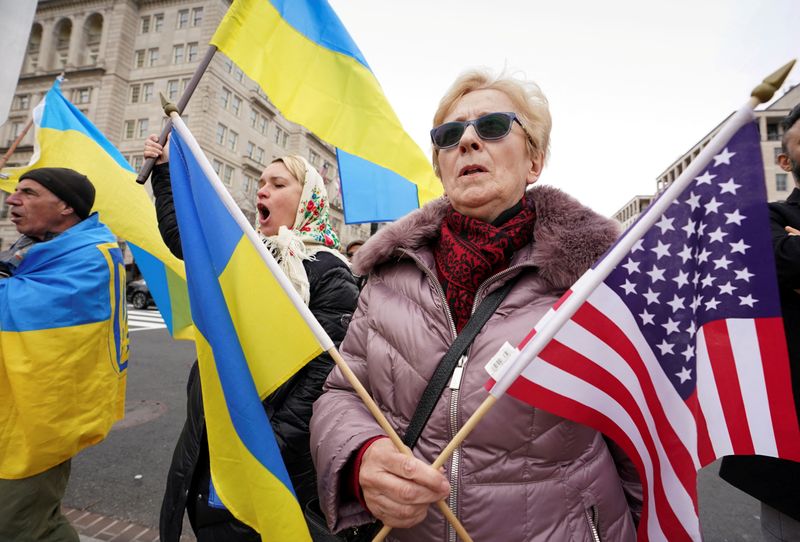
© Reuters. FILE PHOTO: Ukraine supporters protest against Russia’s invasion of Ukraine during a demonstration near the White House in Washington, U.S., March 1, 2022. REUTERS/Kevin Lamarque/File Photo
GAZP
-3.87%
Add to/Remove from Watchlist
Add to Watchlist
Add Position
Position added successfully to:
Please name your holdings portfolio
Type:
BUY
SELL
Date:
Amount:
Price
Point Value:
Leverage:
1:1
1:10
1:25
1:50
1:100
1:200
1:400
1:500
1:1000
Commission:
Create New Watchlist
Create
Create a new holdings portfolio
Add
Create
+ Add another position
Close
By Daphne Psaledakis
WASHINGTON (Reuters) – The United States has imposed several rafts of sanctions on Russia over its invasion of Ukraine in February, targeting its central bank, major lenders, oligarchs and Russian President Vladimir Putin.
On Wednesday, Washington warned that the United States would take measures against Moscow in the coming days over “sham” referendums held by Russia in occupied regions of Ukraine.
Here are some ways in which the United States could further increase sanctions on Russia:
SANCTIONS ENFORCEMENT
Experts said they expect Washington will continue to take measures enforcing its existing sanctions on Russia and target those helping Moscow to evade sanctions.
The United States could also enforce secondary sanctions against designated Russian entities and individuals, which would threaten anyone in the world performing transactions with Russia, Edward Fishman, who worked on Russia sanctions at the State Department during President Barack Obama’s administration, said.
The targeting of foreign entities over sanctions evasion would not be surprising, Brian O’Toole, a former Treasury Department official now with the Atlantic Council think tank, said.
O’Toole also said he anticipates Commerce Department enforcement actions, though he said it might be a “slower burn”.
Commerce could blacklist additional companies for violating its expansive export controls on Russia. Being added to the entity list forces U.S. suppliers to seek a special license before shipping to a blacklisted entity.
OLIGARCHS, HUMAN RIGHTS VIOLATORS
The United States could still impose sanctions on Russian oligarchs and others who have not yet been targeted, experts said.
The U.S. State Department’s head of sanctions coordination, James O’Brien, told the Senate Foreign Relations Committee on Wednesday that the United States would look to human rights violators in future sanctions packages.
SANCTIONS ALIGNMENT
The United States, European Union and United Kingdom could harmonize their sanctions lists, which have differences when it comes to names of those who have been designated, O’Toole said.
“I think leveling the playing field would probably be a smart move for everybody, so there’s not confusion and nobody’s taking advantage of one jurisdiction versus another,” O’Toole said.
The United States could bring its measures on oligarchs in line with the EU and United Kingdom, which have targeted several Russian oligarchs not so far designated by Washington.
They include billionaire Roman Abramovich and tycoon Mikhail Fridman.
ENERGY
Washington and its G7 partners have said they will put a price cap on Russian oil in place, set to begin Dec. 5, but have held back from directly targeting major Russian energy companies over concerns about energy prices and supply.
Elizabeth Rosenberg, Treasury assistant secretary for terrorist financing and financial crimes, told the Senate Foreign Relations Committee on Wednesday that Russia’s largest source of hard currency is from energy sales.
“It’s in energy where we must focus our attention in order to deny Russia that revenue,” she said.
The United States could still impose full blocking sanctions on major Russian energy companies, such as Rosneft and Gazprom (MCX:GAZP), Fishman said.
“The biggest card left on the table, of course, is Russian oil sales,” Fishman said.
The United States could also target Gazprombank with full blocking sanctions, O’Toole and Fishman said, wielding Washington’s most powerful sanctioning tool and adding it to the SDN list.
“The two major things left on energy are blocking the companies and the associated bank,” Fishman said.
TIGHTENED SANCTIONS ON BANKS, STATE-OWNED ENTERPRISES
Washington could also target other banks and state-owned enterprises, experts said.
The United States has imposed sanctions on major Russian banks, including Sberbank, the country’s largest lender.
But Washington could target the banks that have stepped in to fill the void left by those that have been cut off by sanctions and are facilitating transactions for the designated lenders, O’Toole said.
Full blocking sanctions on all remaining Russian banks would be a good option, Fishman said.
He added that one of the biggest gaps is the lack of blocking sanctions on major Russian state-owned enterprises.
O’Brien said on Wednesday that Washington would look to the financial sector and high technology, especially for energy exploitation in future sanctions actions.
He also said Washington would maintain focus on Russia’s military supply chains.
TRADE, FINANCIAL EMBARGOES
Washington could extend embargoes on the Donetsk and Luhansk regions to include Zaporizhzhia and Kherson, to encompass the four regions in Ukraine where Russia has held the referendums, O’Toole said.
U.S. President Joe Biden signed an executive order in February to prohibit trade and investment between U.S. individuals and the two breakaway regions of eastern Ukraine, Donetsk and Luhansk, after Russia recognized them as independent.
But Fishman said since Zaporizhzhia and Kherson are not entirely under Russian control, such an embargo may inadvertently hurt Ukrainians.
A total financial embargo on Russia further down the line is another possibility, O’Toole said, though he said he thinks such a move would be unlikely to happen unless there were a direct attack on a NATO member state or if a nuclear weapon was used.
It would likely be implemented through the issuance of a new executive order that would bar Americans from exporting to or importing from Russia goods, services or technologies, said O’Toole.
Source: Investing.com






























